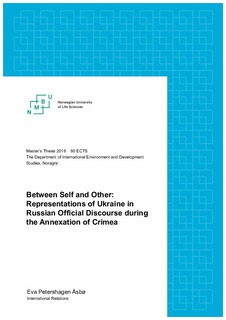| dc.description.abstract | On March 18, 2014 the Russian president Vladimir Putin signed an executive order that officially integrated Crimea into the Russian Federation. The West condemned the annexation of Crimea as illegal, and Russia was accused of violating international law and supporting separatism. Simultaneously, however, Russia advocates strongly for state sovereignty, upholds that states should not intervene in the business of other states, and fear separatist movements within own borders. How then, is it possible for Russia to annex territory from another sovereign country, when doing so undermines state sovereignty and legitimise separatism? By applying the method of discourse analysis, this thesis has attempts to analyse Russian official discourse from the suspension of AA on November 20, 2013 to the annexation of Crimea on March 18, 2014, to see how the Russian annexation of Crimea was made possible. The thesis does not attempt to answer why Russia annexed Crimea, but to look at how the annexation was made possible through discursive practice. The analysis is built on a poststructural reading of the theory of Self and Other, that assumes that identity and foreign policy are mutually constitutive. The theoretical assumption guiding the analysis is that the social construction of a radical Other cannot in itself explain why Russia broke the principle of sovereignty and violated another state’s sovereign territory. Rather, one must analyse the degrees of otherness and various Selves that produce several temporal, ethical and spatial identities. Especially the combination and struggle, between ethical and temporal identity constructs seems to make possible Russian annexation of Crimea. | nb_NO |
